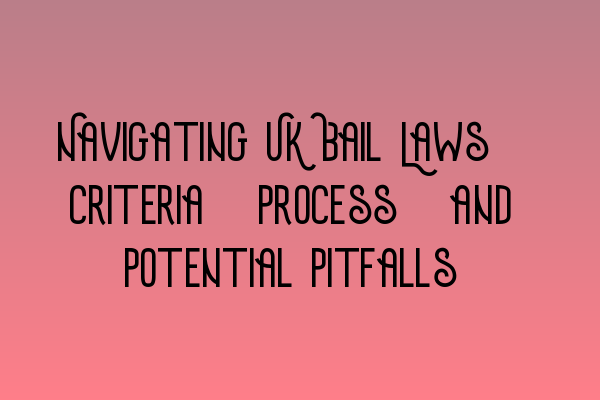Navigating UK Bail Laws: Criteria, Process, and Potential Pitfalls
Welcome to the SQE Criminal Law & Practice Law UK blog! In this article, we will delve into the complexities of navigating UK bail laws. Understanding the criteria, process, and potential pitfalls of bail is essential for any criminal law practitioner. So, let’s jump right in!
Criteria for Granting Bail
When determining whether to grant bail, the courts consider several key factors. First and foremost, they assess the risk of the defendant absconding or interfering with witnesses. They also take into account the seriousness of the offense and whether the defendant poses a threat to the public. Other considerations include the defendant’s ties to the community, previous criminal history, and whether there are any grounds to believe they may commit further offenses while on bail.
It is important to note that the court’s decision regarding bail is not arbitrary. The law has established a framework to guide judges in their decision-making process. Familiarizing yourself with this framework can greatly benefit your clients and improve your chances of securing bail. To gain a comprehensive understanding of UK bail laws, attending our Workshops and Seminars on Criminal Practice: Expanding Your Expertise is highly recommended.
The Bail Application Process
The bail application process involves submitting an application to the court, outlining the reasons why your client should be granted bail. It is crucial to provide compelling arguments and evidence to support your case. A skilled criminal law practitioner must navigate the legal complexities and prepare a persuasive bail application.
Staying updated with the latest developments in UK criminal laws and procedures is vital. Check out our article on Updates in UK Criminal Laws: Staying Informed and Prepared to ensure you are equipped with the knowledge required to navigate the bail application process effectively.
Potential Pitfalls
Bail applications can be challenging, and there are potential pitfalls that both seasoned and aspiring criminal law practitioners should be aware of. One such pitfall is failing to address the concerns raised by the prosecution or the court. Understanding the specific grounds on which bail can be denied is crucial in building a strong case for your client.
If you want to enhance your SQE Criminal Law study group experience and gain an in-depth understanding of criminal evidence rules, we highly recommend reading our extensive guide on Decoding Criminal Evidence Rules: A Detailed Analysis.
Another potential pitfall is underestimating the importance of presenting a coherent and persuasive argument. Effectively articulating why bail should be granted and addressing any potential concerns is essential. To further develop your skills in building compelling arguments, consider exploring our article on Enhancing Your SQE Criminal Law Study Group Experience.
Conclusion
Navigating UK bail laws requires a deep understanding of the criteria, process, and potential pitfalls. As a criminal law practitioner, it is crucial to stay informed, upskill, and continuously expand your expertise. By attending our workshops and seminars on criminal practice, you can enhance your knowledge and develop the necessary skills to effectively handle bail applications.
In the challenging realm of criminal law, having access to valuable resources and guidance is paramount. For a deep dive into fraud and financial crimes, be sure to check out our detailed article on Deep Dive into Fraud and Financial Crimes in the UK.
Remember, staying informed, prepared, and constantly expanding your expertise is the key to success in the field of criminal law.
